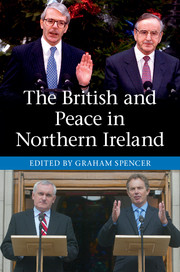Book contents
- Frontmatter
- Dedication
- Contents
- Notes on contributors
- Acknowledgements
- Brief chronology of the peace process
- Abbreviations
- Key documents
- Introduction
- 1 The terrain of discourse
- 2 The Anglo-Irish Agreement: an interview with Sir David Goodall and Lord Armstrong of Ilminster
- 3 The constitutional issue in Irish politics
- 4 Negotiations and positions: an interview with Sir John Chilcot
- 5 Resolving intercommunal conflict: some enabling factors
- 6 Tactics, strategy and space
- 7 The Joint Declaration and memory
- 8 Movement and transition in 1997: Major to Blair
- 9 The challenge of symmetry in dialogue: an interview with Sir Joseph Pilling
- 10 Why was the Good Friday Agreement so hard to implement?: lessons from ‘Groundhog Day’, 1998–2002
- 11 Text and context: an interview with William Fittall
- 12 The nature of dialogue: an interview with Sir Jonathan Phillips
- 13 Managing the tensions of difference: an interview with Jonathan Powell
- Conclusion
- Index
- References
12 - The nature of dialogue: an interview with Sir Jonathan Phillips
Published online by Cambridge University Press: 05 March 2015
- Frontmatter
- Dedication
- Contents
- Notes on contributors
- Acknowledgements
- Brief chronology of the peace process
- Abbreviations
- Key documents
- Introduction
- 1 The terrain of discourse
- 2 The Anglo-Irish Agreement: an interview with Sir David Goodall and Lord Armstrong of Ilminster
- 3 The constitutional issue in Irish politics
- 4 Negotiations and positions: an interview with Sir John Chilcot
- 5 Resolving intercommunal conflict: some enabling factors
- 6 Tactics, strategy and space
- 7 The Joint Declaration and memory
- 8 Movement and transition in 1997: Major to Blair
- 9 The challenge of symmetry in dialogue: an interview with Sir Joseph Pilling
- 10 Why was the Good Friday Agreement so hard to implement?: lessons from ‘Groundhog Day’, 1998–2002
- 11 Text and context: an interview with William Fittall
- 12 The nature of dialogue: an interview with Sir Jonathan Phillips
- 13 Managing the tensions of difference: an interview with Jonathan Powell
- Conclusion
- Index
- References
Summary
Interview
GS: You came into the peace process just before the collapse of the institutions in 2002. Can you give me an overview of the frantic activity that took place to try to get the institutions up and running again? How did you re-build?
JP: Although the collapse of the Executive and the institutions happened very quickly, it had also been widely predicted for many months. The initial approach was to make sure that all the parties to the process remained engaged in the search for a solution. Of course, they were principally the people who most obviously had fallen out, the Ulster Unionist Party (UUP) and Sinn Féin. There was much private dialogue in the weeks immediately following. That period also included a change of secretary of state. John Reid was moved in an unexpected Cabinet reshuffle and replaced by Paul Murphy. This was less of a dislocation than might sometimes be the case because Paul arrived with earlier experience from the Good Friday Agreement (GFA) negotiations in 1997–8. This meant that he was able to hit the ground running, engaging quickly in political discussions that necessarily had a strong Number 10 lead.
GS: In what way does private dialogue work, and does it work better than public more open dialogue?
JP: In my experience private dialogue is the context in which real progress is generally made. There are, of course, exceptions, but in general that is the case. In the autumn of 2002, in a situation in which the PIRA had not come forward with language that confirmed that the conflict was at an end and trust had broken down, the fear of many was that the whole GFA structure would unravel. So, the immediate objective was to try to find a way of restoring the political institutions, but that was not going to happen without significant progress being made on the underlying issues, such as the PIRA's continuing activity, the need for clear evidence that the conflict was being brought to an end, action on decommissioning and, from the other side, progress on the Sinn Féin agenda, which contained many elements, from ‘demilitarisation’ to aspects of human rights and so on. All those topics were much better suited to private dialogue in preparation for a later public phase, which took place in the context of the Joint Declaration negotiations of 2003.
- Type
- Chapter
- Information
- The British and Peace in Northern IrelandThe Process and Practice of Reaching Agreement, pp. 277 - 301Publisher: Cambridge University PressPrint publication year: 2015



